#Action theory
Explore tagged Tumblr posts
Text
The Philosophy of Agency
The philosophy of agency is a branch of philosophy that explores the nature of human action, the capacity for individuals to act, and the conditions under which actions are performed. It is primarily concerned with understanding what it means to be an agent, how agency is exercised, and what factors influence or determine an agent’s actions.
Key Concepts in the Philosophy of Agency:
Agency:
Definition: Agency refers to the capacity of an individual to act independently, make choices, and impose those choices on the world. An agent is typically understood as a being with the ability to initiate actions based on desires, intentions, or reasons.
Central Question: What does it mean to be an agent, and what are the essential characteristics that distinguish agents from non-agents?
Free Will:
Relationship to Agency: Free will is a central concept in discussions of agency. It concerns the ability of individuals to make choices that are not determined by prior causes. The extent to which agents possess free will is a key area of debate in the philosophy of agency.
Debates: The debate between determinism (the view that all events, including human actions, are determined by preceding causes) and libertarianism (the view that free will is incompatible with determinism and that agents have the ability to choose freely) is crucial in understanding agency.
Intentionality:
Definition: Intentionality refers to the quality of mental states that are directed towards something, such as beliefs, desires, or intentions. An agent's actions are often said to be intentional if they are guided by specific goals or purposes.
Importance: The philosophy of agency examines how intentions translate into actions and how intentional actions differ from non-intentional or accidental behaviors.
Moral Responsibility:
Connection to Agency: Moral responsibility presupposes agency; that is, individuals are held morally responsible for their actions because they are agents capable of making decisions and acting on them.
Questions: How does the capacity for agency relate to moral responsibility? Are agents always morally responsible for their actions, or are there circumstances that mitigate or eliminate responsibility?
Autonomy:
Definition: Autonomy refers to the capacity of an agent to govern themselves, make their own decisions, and act according to their own principles and values.
Relevance: Autonomy is often discussed in relation to agency, especially concerning the conditions that must be met for an action to be truly autonomous (e.g., freedom from coercion or manipulation).
Action Theory:
Field of Study: The philosophy of agency is closely related to action theory, which investigates the nature of actions, the processes leading to actions, and the distinctions between different kinds of actions (e.g., intentional vs. unintentional, voluntary vs. involuntary).
Key Questions: What distinguishes an action from a mere bodily movement? What role do reasons, beliefs, and desires play in the performance of an action?
The Role of Rationality:
Rational Agency: Many philosophical accounts of agency emphasize the role of rationality in guiding an agent’s actions. Rational agents are those who act based on reasons that align with their beliefs and desires.
Debate: There is debate over whether all agency must be rational or whether irrational or non-rational actions can still be considered genuine exercises of agency.
Major Theories of Agency:
Causal Theories of Action:
Overview: Causal theories assert that actions are events caused by mental states, such as beliefs and desires. An action is typically seen as the outcome of a causal chain that begins with an agent's intention.
Non-Causal Theories of Action:
Overview: Non-causal theories challenge the idea that actions must be caused by prior mental states. Instead, they propose that actions can be explained through reasons rather than causes, emphasizing the role of rational deliberation and choice.
Compatibilism:
Overview: Compatibilism is the view that free will and determinism are compatible. Compatibilists argue that agents can be free even if their actions are determined by prior causes, as long as those actions align with their desires and intentions.
Libertarianism:
Overview: Libertarianism asserts that agents have free will and that this freedom is incompatible with determinism. Libertarians believe that agents have the power to make genuinely free choices that are not determined by past events.
Structural Theories of Agency:
Overview: These theories emphasize the structures within which agency is exercised, such as social, economic, or institutional frameworks. They explore how these structures enable or constrain individual agency.
The philosophy of agency is a rich and complex field that examines the nature of human action, the conditions for exercising agency, and the implications for moral responsibility and autonomy. By exploring these issues, philosophers aim to better understand what it means to be a free and responsible agent in a world of complex influences and constraints.
#philosophy#epistemology#knowledge#learning#education#chatgpt#ethics#psychology#Philosophy Of Agency#Free Will#Intentionality#Moral Responsibility#Autonomy#Action Theory#Rational Agency#Causal Theories#NonCausal Theories#Compatibilism#Libertarianism#Agency And Structure#Human Action#Philosophical Theories#Ethical Considerations
10 notes
·
View notes
Text
🚨Reblog for Awareness!
Hello everyone,
Recently RFK Jr has publicly said that he wants to collect medical data from private insurances (and other agencies and sources) in order to enter the data into a database to track people with Autism. He also mentioned they are creating an Autism Registry where people with Autism's data will be tracked and linked back to the patient they are studying.
With that, this is a HIPPA violation, among other things. I implore you to please reach out to your representatives regarding this. This is a slippery slope. RFK Jr is aiming to find a cure to Autism and identify toxins that cause Autism. In case you didn't already know, Autism is a neurotype and not a disease. It cannot be cured. Many have pointed out that because Autism tends to be genetic that this could turn into a Eugenics problem, as the government is trying to prevent Autistic people from being encouraged to reproduce, and stop Autism altogether. As a result of that, normal people are calling for sterilization of Autistic people, and being fed misinformation regarding Autism and vaccines. RFK Jr is refusing to listen to Autism organizations and advocates, but you can speak up!
Please follow the link below to this Google doc that has email templates to send to your representatives. With your help, we can end this targeted attack on those with Autism and this will ultimately protect your medical data rights and honestly probably avoid things like what happened in the Holocaust as well.
#autism#autistic#autistic things#autistic adult#rfk jr#fuck rfk jr#tumblr politics#us politics#politics#current events#authoritarianism#call to action#tumblr memes#memes#funny#free luigi#free palestine#united states#america#viralpost#lgbtq community#lgbt pride#lgbtq#lgbtqia#transgender#trans pride#trans community#autistic community#signal boost#Kestrel's theory of the world
357 notes
·
View notes
Text
Hey, crazy DJ theory coming in
In the audition tapes for TDI, we see this lady in the photo DJ refers to as "mom" as the one who raised him

However, we see a different lady in the show DJ refers to as "mama" who supposedly raised him

Now for a while I thought "Maybe he just has two moms"
And while that still holds true in my mind to a degree, the context has shifted since rewatching the audition tapes again
With what DJ says and how he begins to cry, looking at his mom in the photo

That tells me he lost his mom, and it seems recent (but enough time to accept she has passed)
Not sure when his mama came into the picture, but I'm gonna guess she's a step mom or maybe an aunt that took him into her family, which would explain why DJ gives off only child vibes yet has "brothers"
But hey, that's just a theory
A Total Drama Theory
#td dj#tdi#tda#tdwt#tdi dj#total drama dj#total drama island#total drama action#total drama#total drama world tour#total drama audition tapes#total drama theory#total drama headcanons#td headcanons
237 notes
·
View notes
Note
I’ve only been into/started following MotoGP for a few months. Can I ask how exactly did Marc getting the Ducati seat go down? I’ve seen references of it being jorge messing up/rejecting the seat and that somehow leading to Marc masterminding his way to it but don’t fully get it. Thank you :))))
lmao it was awesome. under the cut shes crazy shes long shes the war of the roses shes game of thrones shes ducati being fucking STUPID !!!!!
okay so the beginning of this season going towards the middle was like. genuinely dominated by discussion of who would end up with the second factory ducati seat, and there were 3 main candidates for the position: 1. enea bastianini, who had the seat but who had had a spotty 2023 marred by injury and was delivering inconsistent results in the early part of 2024, 2. jorge martin, who had been basically promised the seat ahead of them uno reversing and signing enea, and who had contended for the title the year before/was leading the world championship early in 2024, and 3. marc marquez, 8 time world champion and arguable GOAT of the sport, who was doing insane comeback rides on a year old bike that he had very little time to adapt to. on pure results, you would have to go with martin (it was p clear it wasnt going to be my girl enea....), but marc looked uh. very promising and very dangerous (apparently his data, ESPECIALLY in the left handers, was like. bonkers), and who was also undeniably a better business asset to ducati as a company trying to sell motorbikes. and as we all knowwwwww, ducati had BY FARRRR the most dominant bike on the grid, so they are staring down the barrel of like. deciding between three excellent riders for one, extremely coveted seat. they think they hold all the cards here, and after a bit of rampant speculation the ducati bosses say everybody calm the fuck down we will make a decision about the gp25 seat at MUGELLO. forza. and with that the stage is set.
but again. ducati had basically promised jorge martin that seat. in fact, there was a provision in his contract that said if he won the world title in 2023, he would automatically be promoted to the factory team. like if marc doesnt come in on his merry way essentially doing a year long AUDITION for that seat up-to and including crowd-commanding theatrics, then it is undeniably martin's bike to have. and it looks like ducati kinda thought they should honor that too! because it was reported (unofficially but through a multitude of reliable sources) on the thursday before mugello that jorge martin WOULD be signing with the factory ducati team to be in red for 2025 IMMINENTLY. and he shows up to the presscon with the moon shinging out of his ass and we didnt rlly have a reason to doubt him so things are looking pretty locked up tbh
so another piece of the puzzle. for the last few years one cog in the wheel of ducati's dominance has been them having EIGHT bikes on the grid, and as such having insane amounts of data to comb through and synthesize while developing the bike. at the time, the team with the most factory support is pramac racing. but YAMAHA have made a promise to a young shirtless man named fabio quartararo that they will get a satellite team for 2024 to help with THEIR efforts, and pramac's contract with ducati is expiring so theyre the top choice. yamaha offers them a fuck you amount of cash and full factory support to leave ducati and come run the M1s with them. and the thing is, it is EXPENSIVE to run an independent team and this sugar daddy style deal would essentially lock down their immediate future quite nicely, so they are thinking HARD about this— because if they lose jorge martin like. what the fuck are they doing not taking that deal. and YOU are asking me girl what the fuck does this had to do with marc marquez WELLLLL. ducati know that marc wants a gp25. and pramac has the factory spec bikes. and marc's famous ass is a VERY valuable little bargaining chip in their eyes. so ducati APPARENTLY wanted marc on the same deal jorge martin was on (complete with the promise of factory promotion if he won the championship) at PRAMAC in order to keep marc, jorge martin, and pramac all under the umbrella of ducati racing. they think problem solved :) we get to keep everything and everyone :) marc gets a current spec bike, jorge gets to be on the factory team, and we can still run eight bikes :) awesome.
WELL! marc catches wind of all of this and goes. fuck you i want to be a factory rider on a gp25. like why on earth would he move from busted satellite team to busted satellite team that doesnt even have his BROTHER ? so instead of keeping all of these negotiations behind closed doors he trots right the fuck up to the press at mugello and says hello yes i have ABSOLUTELY no intention of riding for pramac, in fact i only have the intention of riding with factory teams. big smile. fuck you. press run wild. domino tipped. pramac pissed off. ducati SWEATING.
AND i guess the ducati CEO (claudioooooo) was there. and some big sponsorship guys (audiiiiiii) were there. and it has been LONG been reported that gigi daligna really wanted marc for that seat (and that pecco REALLY didnt lmao). like bad. some would say carnally. and then i guess they looked at his data. and thought about how well he had already adapted to the gp23. and how badly he was beating bez and company. and i suppose the idea of actually losing marc and him going to a KTM or an aprilia scared the actual genuine NIPS off of these guys and literally by sunday night they had apparently called jorge martin to let him know that it wasnt going to be him and he went over to aleix and got that aprilia contract signed genuinely immediately (and enea later signed with ktm and pramac with yamaha). so the aprilia news was announced on monday and we knew marc was the choice from that, and then they announced it officially in the dumbest smuggest little video of all time a lil while after. but not before marc took a selfie in a shirt that said FACTORY PILOT that he later lied about and said wasnt on purpose. king. done and dusted. insanity.
so to recap: in the course of four days, marc essentially pulled a coup out of thin air by just. deciding to exercise some muscle with the press, which caused ducati to lose two bikes, secured the best seat on the grid for himself, and made sure that two of the riders that finished top four in this year's championship (including the CHAMPION) are on much worse machines going into next year. like he literally created the best possible outcome for himself by virtue of his reputation, media savvy, and sheer force of will. it was absolute crazy shit and SO much fun to watch play out live
#go back and listen to the oxley bom pod from mugello you will get most of this background info. the climate on the dash however#that will have to live on in my heart#callie speaks#asks#in terms of jorge flubbing its a theory that it was his camp that leaked him maybe getting the seat EARLY#which spurred marc into action and turned ducati off him a bit. but thats just a rumor#primer#mgp
245 notes
·
View notes
Text
I realized I know why Harley strikes me as honest despite that he told us in QnA that he manipulates us with his words.
It's because he believes in things he says. Ofc he's biased but what he told us about Poppy is what he actually believes to be true that she like her father is a backstabber.
And you know we can't call it a manipulation if a person believes in the things they say to us.
Ofc Harley is full of himself and he sees himself above everyone else.
But there's something about him that doesn't allow me to say with 100% certainty that he's a narcissit like many people seems to believe so.
Cause honestly I think that the only person Harley is lying to is he himself.
He didn't even say that he hates Elliot the most even though I bet everyone thought so. And yet.
And he was shocked by Dr White's betrayal. He said that he thought that he saw his vision.
And even if he hates Leith the most he said that he's two-faced and a backstabber.
So do you want to tell me sir that at some point you thought that you could trust any of those two?
Even if you already had trust issues after Elliot backstabbed you?
Idk I'm probably grasping at straws but Sawyer seems like he's looking for any form of connection but because he is the way he is everyone denies him.
He even tried to get us to understand him. But why?
I get it. He was trying to manipulate us.
But there was something in his answers in QnA.
I just can't shake off the feeling that Sawyer seems to act like a kid. As if he just stuck at one point in time and never actually grew up.
And the fact that he's so distanced and almost detached emotionally from his past - childhood especially - I'm pretty sure that he went through something traumatic that he represses and is socially and emotionally stunted.
He still displays sociopathic/psychopatic and narcissitic traits but he seems plenty delusional.
Not only in grandiose way that he has a mission to find immortality and lead humanity into the future.
But also in a way were he still expects that he'll finally find understanding. Despite his paranoia and that Elliot betrayed him and that his coworkers used to laugh at his fears of world ending soon he still thought that someone saw his vision. He still was surprised that someone betrayed him.
Despite that he projects his trauma on everyone around him he still felt that he could trust someone at least about work and then was shocked at the betrayal.
He's biased as hell but he's honest.
And I think that he was still afraid of dying. Is it because he's so obsessed with himself? Maybe. But a part of me thinks that this is something that goes deeper. This fear is a core part of him hence his paranoia about world end.
And I believe it's due to his childhood trauma. Whatever his parents did to him caused him to be like that.
And I believe that Elliot kicking him out of YGP hurt so much also and maybe even mainly because he had to go back home. He wrote that he thought that Elliot cared.
This is something that stood out to me. Cared about what?
Because lines like "I thought he understand" and "nobody understands" are just your really simple lines of someone who will soon become a villain.
But "I thought he cared" it reveals to us that Sawyer liked Elliot. It's a line that comes from the kid that yearns for connection. That yearns for care and love that he never received at home.
I feel really bad for him.
He was betrayed so many times and he hoped for something still...
That's why he works as the main antagonist of horror franchise. Cause he's a tragic character that is so broken that he turned into a monster and he'll torment everyone by projecting his trauma and hurt.
And it's also tragic because he would never change because no one would help him because he's done so many awful shit.
I love him <3
#poppy playtime#ppt#ppt the doctor#ppt doctor#ppt harley sawyer#ppt qna#ppt theory#ppt elliot ludwig#ppt leith pierre#ppt bruno white#the doctor#doctor harley sawyer#dr harley sawyer#harley sawyer#elliot ludwig#leith pierre#bruno white#i could talk about it for hours#cause i didn't even say anything about how he feels about experiments#cause even if it may seem like he tries to justify his own actions#he sounds so desparate#as if it was this or nothing#bxnxnxnnxnxnnx#he's so silly#i wish i could yap about my hcs of his parents and all but that has to wait#:3c
98 notes
·
View notes
Text
DPXDC Prompt#148 Part 2
Danny feels himself grow bright red and the two stare into each other's eyes for what felt like an eternity.
“I- Uh… I’m Danny” He finally managed to mutter.
“Damian Wayne, its a pleasure to make your acquaintance.” Danny's blush grew even brighter as the next moment Damian kissed his hand, Danny couldn’t help but feel flustered.
After a moment Danny rubbed the back of his neck with his hand and stuttered out, “It’s nice, to meet you too” He could tell how happy Damian was to meet him and he felt a little bad for feeling nervous in the first place. Danny thought Damian was cute and he decided then that he wouldn’t mind getting to know him a little better. First they had to get through the rest of the gala, and soon as he thought about the gala something clicked.
He realized Damian was the son of Bruce Wayne who at the moment was talking to his own parents. He couldn’t help but stare as he let the information sink in.
“Ah yes it looks like Father is talking to some of the scientists that were invited.” Ancients, Danny knew his parents couldn’t help being themselves and unfortunately that meant things like accidentally spilling fudge right onto Mr. Wayne's suite. They watched as Mr. Wayne told his parents it wasn’t a problem and then walked out of the room.
Danny couldn’t help but sigh, “Sorry about them, my parents are a little eccentric. Don’t even get me started on their obsession with ghosts, my dad will not shut up sometimes.” Danny rubbed the back of his neck nervously again as he realized he was rambling a little bit.
“Don’t worry it looks like Father handled the situation well, although I am curious what kind of inventions two scientists obsessed with ghosts create. That’s what this gala is about, we want to support scientists in untapped fields of study.” Danny listened as his soulmate explained things to him.
Danny looked over to see Vlad talking to a thin scientist in the corner of the room. He was definitely up to something, a ball like this had Vlad scheming something with a mad scientist written all over it.
He was brought out from his thoughts as a loud crash could be heard as the wall across the room burst open and none other than the Joker walked through.
Danny tried to make his way to the other side of the gala, strangely Damian had disappeared but Danny didn’t have the time to look for him.
However when he got to the door staying low to the ground the door burst through and more of Joker's goons looked straight at him and he found himself tied up right in front of the Joker.
“What do we have here? A new Wayne?” Joker said as he cupped Danny's face in his hand. Danny couldn’t do anything about the situation and he was getting a little scared considering he didn’t have a proper way to go ghost or protect his soulmate at the moment.
The Joker circled around the tied up hostages laughing, “Of course now the fun begins”
The Joker continued to circle around the hostages thinking for a moment before he grabbed Danny.
He held Danny by the back of the shirt like a small kitten. His obsession was making him wonder if his soulmate was safe living in Gotham. Joker chuckled as he continued to hold Danny.
“This kid will be an example for the rest of you, I don’t want any outbursts like that again, especially when Batman gets here. Do you think Batman will like what I’ve done with the place?” He asked as he gestured around the ruined room. All of the tables and chairs had either been broken or knocked over and all of the food from the dessert and appetizer tables. It was quite the mess. Before Joker could do much else with the teen he had dangling in his grasp something flew out and smacked Joker right in the back of the head causing him to drop Danny.
Danny took that opportunity to get away, his hands may have been tied but his feet were sure free. He stumbled away as Batman dropped down and a fight between him and the Joker commenced.
Danny ran towards the door and as he got there Robin and Nightwing were there ushering some of the other hostages out of the room.
“Right this way citizens!” Nightwing said brightly at them but he seemed to brighten up a bit more when he saw Danny weirdly.
“Have either of you seen Damian Wayne?” Danny asked, he at least wanted to get his number, especially when he was headed back to Amity soon.
They seemed to share a look before looking back at him, “Damian left, he’s headed safely back to Wayne manor.” Robin said but he held out a piece of paper. On it was Damians signature and his phone number. Danny sighed a little annoyed he had left but he guessed it was common to head back home after a rogue attack in Gotham.
“Danny!!” the booming voice of Jack Fenton was suddenly heard and Danny felt himself getting pulled into a very familiar bear hug.
“Did you have fun at the gala? Your father and I saw you talking to Mr. Wayne's son,” His mother said after his feet were back on the ground.
“Yeah, actually can we talk about that after we’re back in our room?” He wanted to tell his parents he found his soulmate but saying that outloud when Damian was the son of Bruce Wayne sounded like a bad idea.
They headed back to the hotel room and all Danny could think about was how lucky he was to have met his soulmate tonight, even if he was nervous about everything.
Master Post:
Last:
Next:
#dp x dc prompt#dp x dc#dc x dp#danny fenton#danny phantom#poor danny#Damian thinks its cute that he flustered his soulmate so much#I feel like I'm bad at this LMAO#how does one write romance?#Please tell me if I'm doing this wrong#I want to write the reveal but I don't want to do it right away#suspense? how do I write that?#Well I tried to do a little bit of action#I love the idea that Danny's so light everyone just throws him around like a ragdoll#Ragdoll theory? I cant remember if there was an actual name for it#anyways I've got to go look for a job now#my asks are open#all my prompts are free to use#soulmates
599 notes
·
View notes
Text
Malleus Draconia versus Ortho Shroud
It seems some people are surprised at Malleus’ actions? That he destroyed the robot dogs and almost destroyed Ortho.
But I would like to point out that Malleus has always been like this; very protective of his loved ones.
For example: In Lilia’s PE vignette, he nearly took Rook’s head off because he thought Rook was trying to hurt Lilia.
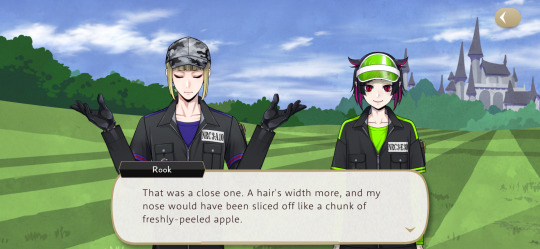
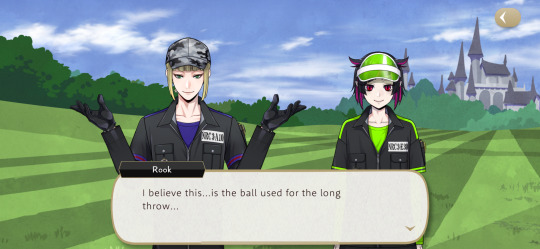
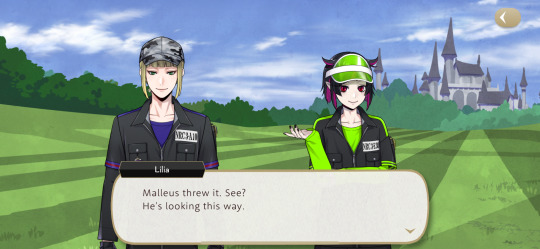
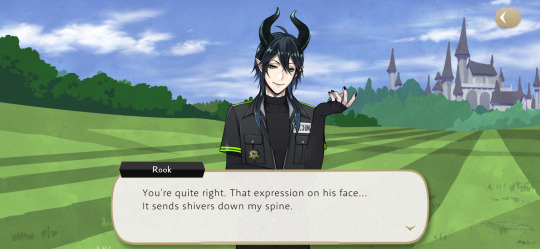
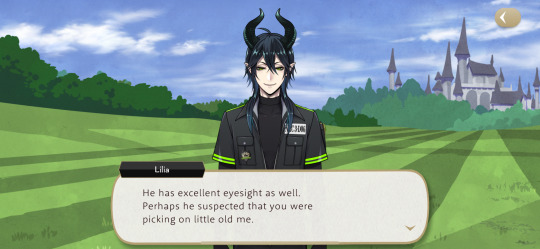
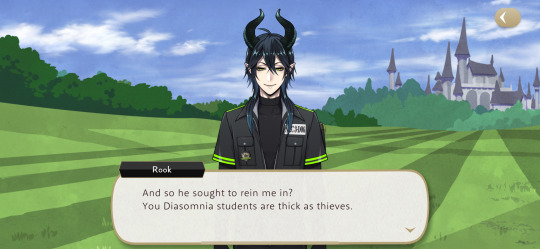
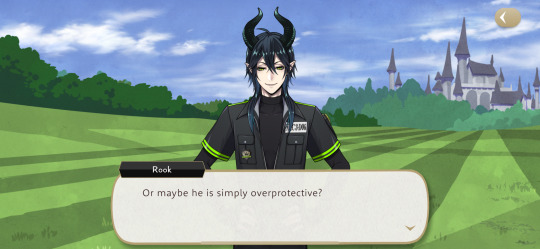
Then we come to book 7, chapter 7 update.
Yes, he destroyed the dogs and almost Ortho but remember Malleus is protective of his loved ones.
Malleus OBed because he wants his loved ones happy and Ortho is a threat to that, so of course he’s going to destroy any threats to them and Ortho basically labeled himself as such.
Now I want to bring up a point that I don’t see many talk about?
Malleus understood Ortho’s explanation about how Ortho woke up and how he was able to penetrate the barrier.
Ortho described himself as immortal basically because he can transfer his data to any body, which Malleus understood as transferring vessels.
This is when Malleus finally took the steps to destroy Ortho. Not because he wanted to kill him, but because he knew that Ortho would still live and transfer himself to another body.
Did Ortho feel fear? Yes because Orth doesn’t like lightning and that’s one of Malleus’ powers but think about it.
Feeling fear is an emotion no one wants to repeat. Malleus acknowledged that Ortho might be feeling fear
With Malleus knowing that Ortho can feel such things, Malleus told Ortho he would end him swiftly because in a way that is an act of kindess isn’t it? To end it quickly rather than prolonging the fear.
But at the same time he knows that Ortho will live and remember this emotion, and that’s what Malleus wants, so Ortho would be too scared to try again.
Malleus is protective of his loved ones and he always has been.
While his actions might seem as if he’s out of control, he isn’t. He understood in his own way what Ortho explained to him before making his move.
He didn’t attack because he’s raging but made a more calculative move on his end to stop Ortho, one that he would make repeatedly if need be, since he knows that Ortho can transfer bodies.
#not to say that malleus is not being affected mentally#remember he now knows the truth about his birth and the senate and his grandma#on top of that he’s using a bunch of magic and been OB for awhile and people are waking up and rejecting his gift#so yes he’s being affected mentally and emotionally but this post is not about that#it’s about how his actions are not surprising and how he took a calcualtive strategy not one where he’s unhinged and going to kill ortho fo#no reason but because he knew that ortho would be alive and well#additionally malleus being evil was very hot this is what you should expect from a far#ortho shroud#malleus draconia#twst book 7#diasomnia#twst malleus draconia#twst theory#twst theories#twst ortho shroud#lilia vanrouge#twst analysis#disney twst#twst#twisted wonderland
616 notes
·
View notes
Text
“An ounce of action is worth a ton of theory.”
Ralph Waldo Emerson
#action#theory#ralph waldo emerson#philosophy#will to power#action oriented#actions#words#word#quote#lit#literature#active#get active#stoicism#stoic#wisdom#know they self#English#English literature#quotes#quote of the day#new day
159 notes
·
View notes
Text
The Philosophy of Behavior
The philosophy of behavior, also known as the philosophy of action, is a branch of philosophy that examines the nature, causes, and significance of human and animal behavior. It seeks to understand the underlying principles that govern actions and the relationship between behavior, intentionality, and agency. Key concepts and theories in the philosophy of behavior include:
Intentionality: Intentionality refers to the directedness or purposefulness of mental states and actions. Philosophers explore how intentions influence behavior and the role of intentionality in understanding the meaning and rationality of actions.
Free Will: The question of free will is central to the philosophy of behavior. Philosophers debate whether individuals have the capacity to choose and control their actions freely, or if behavior is determined by factors beyond conscious control, such as genetics, environment, or unconscious processes.
Agency: Agency refers to the capacity of individuals to act independently and make choices. Philosophers examine the conditions under which agents can be held responsible for their actions, the relationship between freedom and responsibility, and the constraints on agency imposed by social, cultural, and psychological factors.
Motivation: Motivation plays a crucial role in behavior, influencing the reasons why individuals act in particular ways. Philosophers analyze the nature of motivation, including desires, beliefs, emotions, and values, and how these factors shape behavior and decision-making.
Action Theory: Action theory explores the nature of actions, their causal mechanisms, and the criteria for distinguishing between intentional and unintentional actions. Philosophers investigate the structure of actions, the role of mental states in guiding behavior, and the relationship between actions, outcomes, and consequences.
Practical Reasoning: Practical reasoning involves the process of deliberation and decision-making in everyday life. Philosophers examine how individuals reason about actions, weigh competing values and considerations, and make choices based on practical concerns and ethical principles.
Behaviorism: Behaviorism is a psychological approach that emphasizes observable behavior and external stimuli as the primary determinants of behavior. Philosophers discuss the implications of behaviorism for understanding human agency, consciousness, and the mind-body relationship.
Ethical Behavior: Ethics considers the moral dimensions of behavior, including questions of right and wrong, good and bad, and the principles that guide ethical conduct. Philosophers explore ethical theories and principles, moral reasoning, and the application of ethical norms to individual and collective behavior.
The philosophy of behavior addresses fundamental questions about human nature, consciousness, and the factors that influence how individuals act and interact in the world.
#philosophy#epistemology#knowledge#learning#chatgpt#education#metaphysics#ethics#psychology#Intentionality#Free will#Agency#Motivation#Action theory#Practical reasoning#Behaviorism#Ethical behavior#Human nature#Consciousness
7 notes
·
View notes
Text
people on twitter always talk about curlfeather like she's one of the most sick and twisted, irredeemably fucked up villains ever created in the series but she's honestly one of the tamest in regards to her actual actions overall and also dies horribly in the first book of the arc so all of her actions are revealed posthumously LMFAO
#'but she manipulated children' yeah literally every villain in the series does that. it's like their go to.#'grooming' is a word with multiple definitions but very serious connotations and it's always used in the worst faith for curlfeather#people say she hits closer to home but I think she's the same level of fantastical vs realistic in her actions/goals as any other villain#or she's often misrepresented to fit a preexisting mold for an abusive/manipulative parent as opposed to how she actually is#also do people still think her killing her husband is canon???#cause that one's like. entirely made up. it's either a since debunked theory or an au it's not up for question#wc talking
87 notes
·
View notes
Text
"Years before you wouldn't have picked my Brother Yancy and I for heroes. No chance. We were never star athletes. Never at the head of the class. But we could hold our own in a fight. We had a unique skill: We were drift compatible."
This quote right here establishes Pacific Rim's rejection of heroism as understood through the lens of Great Man Theory (which posits that great deeds are performed by remarkable individuals), and establishes that cooperation and collective action is where it's at. Raleigh and Yancy's ability to pilot a Jaeger didn't come from any special skills or abilities, but from their ability to work together.
#pacific rim#pacific rim 2013#great man theory#the hero's journey#collectivism#collective action#heroism#raleigh becket#yancy becket
74 notes
·
View notes
Text
sunrise on the reaping spoilers !!!
sorry, i see people talking about how maysilee donner in all her "one of us has to be the worst victor in history. tear up their scripts, tear down their celebrations, set fire to the victor's village. refuse to play their game." glory was not a rebel?? did we read the same book?
haymitch himself agreed that maysilee was twice the rebel he ever was, standing up to the capitol with an upturned chin and sharp words from day one without ever wavering. why else do you think they took her voice to kill her?
#SHE KILLED THE GAMEMAKERS! with zero (0) hesitation#just because she wasn't organised with the rebellion doesn't mean she wasn't a rebel#if lenore dove was one with her banners and her songs#then maysilee was one with her words and her actions#“i'll be your sister” on its own is REVOLUTIONARY to a stranger in the tribute center#i genuinely believe that if haymitch had told her about the plot it might have worked#i understand why he didn't and would never blame him (even though He Does)#but had maysilee known she could have been katniss#i know that in my heart#also. personal hc for fun. she didn't know about lenore Just because of the orange paint#(because while maysilee could have understood it from that but i don't think that would be sufficient enough evidence)#(considering she said she “knows her secret”#i think maysilee was also doing underground resistance work in twelve#anything from insulting peacekeepers to messing up deliveries to politicians to painting banners#miss girl was angry#that's why she was always so crass. it was her way to elevate herself from what they reduced her to#i ADORE her#expect maysilee essays and fics from me#she's underrepresented#sunrise on the reaping#sunrise on the reaping spoiler#sunrise on the reaping spoilers#sotr#sotr spoiler#sotr spoilers#maysilee donner#maysilee donner headcanon#maysilee donner hc#maysilee donner theory#sotr theory
79 notes
·
View notes
Text


something interesting i realized while on the vessel-making screen in the deltarune introduction is that it's physically impossible to make kris: there is no hair that perfectly matches theirs (none have the cowlick or the right jagged shape on the bottom), and there is no sweater that perfectly matches theirs (none have a single stripe). this is fascinating, as it perhaps suggest that, if we (the player) had a choice, we *wouldn't* make kris. they aren't something we want, or are even capable of wanting, rather something we're stuck with.
and i suppose the fact that they can't be *created* as a vessel is telling, because we didn't create kris -- they weren't made for us, they're not a player avatar. they're a pre-existing person we just happen to gain possession of.
we weren't made for each other; they don't want us, and we don't seem to want them either (if the inability to choose to create someone like them says anything); funny, then, that in a way we're "soulmates"...
(both pictures are from the deltarune wiki!)
#melonposting#deltarune#deltarune kris#kris dreemurr#deltarune analysis#deltarune theory#kris is such a fascinating person. i want to study them under a microscope#we make them do things they otherwise wouldn't: wonderful things. horrible things.#at the end of the day who will kris be if their actions have been almost entirely us?#what responsibility will they hold for the manipulation and violence we've made them perform?#or what connection will they truly have to the friends we've directed them to make and the good times we've forced them to have?#this is just a random kid at a hard point in their life suddenly directed by an omniscient god with an indecipherable moral compass#kris and the player meant nothing to each other before - but now we hold kris' fate in our hands. we mean everything to them in a sense#and now as we play this game and are compelled by its story - including the things we have kris do - does kris not hold our fate as well?#do they not mean everything to us? (they mean everything to me anyway)#god this game kills me a little bit. god i love it so much
340 notes
·
View notes
Text
James: Okay, so Tonks might like Moony! What do you want us to do?
Sirius: I don’t know but I don’t like where this is going, Prongs!
Peter: That’s ridiculous, Pads. As far as we know, all that happened is two wizards had lunch
Sirius: Yeah, but one of those wizards is a tall, young and brilliant Metamorphmagus
James: Come on. Looks don’t matter to Moony!
Sirius: …
James: Because…he only has eyes for you
Sirius: Nice try
#wolfstar#jealous sirius in action#incorrect wolfstar quotes#incorrect marauders quotes#remus lupin#sirius black#remus x sirius#james potter#peter pettigrew#harry potter#incorrect harry potter quotes#daddiesdrarry on instagram#incorrect hp#sirius x remus#marauders#hp#hp incorrect quotes#hp imagine#hp text post#hp ships#incorrect hp quotes#wolfstar squad#source: big bang theory#incorrect sirius black quotes#incorrect james potter quotes#remus lupin x sirius black#sirius black x remus lupin
99 notes
·
View notes
Text
I have a theory about Airplane's original outline, the one he lost which was supposed to be mature and deal with more complicated themes than what PIDW actually became. Some posts on here made me curious about what other people would think of it.
What if Shen Yuan didn't transmigrate into a copy of PIDW, but the actual original outline?
We know Airplane lost the file when his computer randomly died and that he had plans for Tianlang-jun to be the final boss and for Shen Jiu to be a direct parallel to Luo Binghe.
We're not told when he lost the file.
What part of PIDW was he writing at that moment? Was it when Luo Binghe was 14? But he lost the file, discarded the original outline and went for the stallion novel.
While a new universe was born, as Airplane decided to satisfy his readers more than follow his own ideas, the original universe was left unfinished, lost without an ending.
The system has worked in other universes before, so it knows how to deal with this. It takes a soul from another world to finish the story and bring it to its original ending instead of the one in PIDW.
Who better than the author? Airplane, who had to discard his art to make money for a living. He'd be the perfect one for the job.
But, as we know, Airplane doesn't actually change much. The role of Shang Qinghua proves to be too removed from Luo Binghe, and he's not given enough incentive or instructions to do it.
The system learns from this first mistake: next it takes someone who hates the ending of the PIDW universe, and puts them right where the original outline stops, in a role deeply tied to Luo Binghe, giving them clear objectives and punishments if they don't follow the instructions.
It works.
Shen Yuan is dropped into the original outline and actually manages to deliver on all its promises. That's why Shen Jiu's past is revealed, why we get to know the truth of Tianlang-jun's relationship with Su Xiyan and all that the Palace Master did, all plot points that never existed in PIDW.
(Why the characters are much smarter, why the female characters have a personality other than being their archetypes)
You could argue that they do exist in PIDW, hidden under all the monster fighting and maiden fucking. But PIDW is a stallion novel, with tropes and a narrative that follow a certain structure. I can't imagine the events of svsss ever happening in a story like that.
The original outline though? Yeah, 100%. It already had the potential of being complicated, with all those secrets and mysteries, so it's not that hard for it to add the relationship that is born between Luo Binghe and Shen Qingqiu to the mix.
And, this is the reason why we only got to meet Bingge but not his original outline counterpart.
Let's be honest: if a third universe existed other than svsss and PIDW, with a lonely Luo Binghe that never finds love, you bet your ass he would eventually find his way to svsss like Bingge did. But it never happened.
Because Bingmei is him.
#I'm curious to know what other people think of this#this theory was born mainly because of what i said at the end#if bingge met bingqiu why didn’t the original outline binghe meet them too?#i always though svsss to be a copy of pidw that sy tweaked until it became unrecognizable#and the original outline remained lost with sqh's lost file#but it never sat right with me#so i created this theory#i think it makes sense#and more importantly#original outline luo binghe isn't left to wander the world unmoored like airplane planned#but lives happily ever after with the love of his life#while bingge goes to find his own shen yuan as we all agree#svsss meta#svsss#bingqiu#luo binghe#it also explains why sqh and sqq's experiences are so different#sqh was the system's failed attempt#he was put there as a baby#and the system didn't tell him much#while sqq is thrown right there in the action#and the system follows him constantly
52 notes
·
View notes
Text
Brooklynn actually trying to push Soyona to do the Right Thing, step by step, and failing, but not persisting and just putting her down at the end...it's important to me.
#brooklynn#soyona santos#brokelynn#jwct#chaos theory#chaos theory spoilers#“Don't sell the raptors!”#she tried#and I want to think that it's because she was shaken by her own actions and Soyona saying “You remind me of myself”#and she was wondering if she could turn soyona back because she was slipping herself and didn't know how far she was going to go#lab partners#brooklynn trying to save soyona multiple times and failing but not letting her die...#what a good arc
66 notes
·
View notes